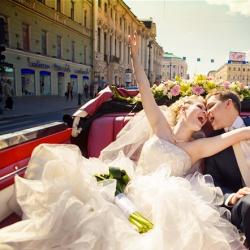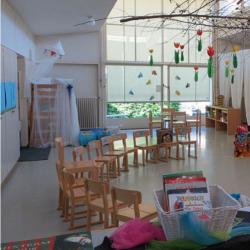Presentation of moral and patriotic education of younger preschoolers. Presentation "Moral and Patriotic Education for Preschool Children." feelings about cultural heritage
MKOU Gvazdenskaya secondary school structural unit kindergarten
Moral and patriotic education of preschool children
in terms of implementation
GEF DOU
Educator: Romanova L.N.

“Love for your native land, native culture, native speech begins small - with love for your family, for your home, for your kindergarten. Gradually expanding, this love turns into love for the Motherland, its history, past and present, for all humanity.” D.S. Likhachev

In accordance with the Federal State Educational Standards, the tasks of preschool educational institutions
combining training and education into a holistic educational process based on spiritual, moral and sociocultural values and socially accepted rules and norms of behavior in the interests of the individual, family, and society;
the formation of a general culture of the personality of children, including the values of a healthy lifestyle, the development of their social, moral, aesthetic, intellectual, physical qualities, initiative, independence and responsibility of the child, the formation of prerequisites for educational activities; clause 1.6.6

Directions of patriotic education in preschool educational institutions:
Formation of ideas
Upbringing
patriotic feelings :
- nurturing love in a child
and affection for your
family, home,
kindergarten, city;
- formation of a careful
relationship with nature
instilling respect for work;
- development of feeling
responsibility and pride
for the country's achievements;
- formation of moral
feelings about cultural heritage;
- formation of tolerant
attitudes towards other nationalities
- introducing children
with folk traditions and
crafts;
- introduction to oral
folk art;
- acquaintance with children's accessible
historical events;
- expansion of ideas
about nature, cities of Russia;
- introducing children to symbols
states
- formation of elementary
knowledge of human rights
Search engine development
behavior in preschoolers

System and consistency
patriotic work
Symbolism(coat of arms, flag, anthem)
Country, its history
Hometown
Kindergarten
Family

Family
« What is family »,
« Do it once, do it twice »
Group decoration for the New Year

Family
Matinee "Family Day"
Older People's Day
Drawing competition “My mother”

Our favorite kindergarten
"We are for peace"
“Help them without hesitation”
Promotion "White Flower"

My small homeland
"My country, my planet"
"At the Monument to the Unknown Soldier"
Excursion to the library
Excursion to the post office

My small homeland
Excursion “Varieties of Transport”
Album “History of the village of Gvazda”
Meeting with V.I. Rogova
Congratulations to the children of war

State symbols
By reading fiction and looking at paintings, children get acquainted with Moscow, the capital of our Motherland.

We live in Russia
"Russia Day"
Excursion “This is what a flag is”
"Our symbols of Russia"
"Russia Day"





WITH THANK YOU FOR YOUR ATTENTION!

















1 of 17
Presentation on the topic: Patriotic education in preschool educational institutions
Slide no. 1

Slide description:
Development of social and personal qualities of preschool children through patriotic education MBDOU kindergarten No. 45 “Yagodka” of a general developmental type with priority implementation of activities in the social and personal direction of children’s development “Where does the Motherland begin?” The work was completed by teacher Ivanova E.M. 900igr.net
Slide no. 2

Slide description:
Patriotism - love for the Motherland, devotion to it, responsibility and pride for it, the desire to work for its benefit, to protect and increase its wealth - begins to form already in preschool age. You cannot be a patriot without feeling a personal connection with your Motherland, without knowing how our ancestors, our fathers and grandfathers loved and took care of it. Already in kindergarten, as a result of long-term, systematic, purposeful educational work, elements of citizenship and patriotism can be formed in children. A preschool child's love for the Motherland begins with love for his family, his home, kindergarten, and city. After all, vivid impressions of the native nature, the history of the native land, received in childhood, remain in a person’s memory for a lifetime.
Slide no. 3

Slide description:
Relevance of the problem The problem of patriotic education of the younger generation is one of the most important today. Children, starting from preschool age, suffer from a lack of knowledge about their hometown, country, and the peculiarities of Russian traditions. They treat close people and group mates with indifference. They lack empathy and compassion for the grief of others. The system of working with parents on the issue of moral and patriotic education is not sufficiently formed.
Slide no. 4

Slide description:
Tasks that solve these problems: To increase the educational, professional, theoretical and practical knowledge of teachers on the problem of moral and patriotic education of preschool children. Systematize the knowledge and skills of teachers and children on this issue. To develop in a child of senior preschool age social and personal qualities such as compassion, empathy, self-esteem and awareness of himself as part of the world around him. Help parents develop and maintain children's curiosity in the process of joint activities.
Slide no. 5

Slide description:
Forms of work with children on civic-patriotic education: Targeted walks to monuments of military glory, along streets named after heroes of the Great Patriotic War; Excursions to memorable places. The content of such excursions is: observation of ritual moments (laying flowers at the monument, a minute of silence, meeting with war participants). The same excursion is carried out with the participation of parents. They are offered a “Weekend Itinerary” with a detailed description of the site being visited and recommendations for easily introducing the child to the monument. Reading fiction appropriate to the age category of children - about the defenders of their native land, the Fatherland. Parents are given recommendations to visit district libraries with their children. Using audio and video equipment to listen to music about the Motherland, showing children films about the exploits of Russian people.
Slide no. 6

Slide description:
Examination of illustrations, paintings, reproductions and newspaper clippings containing historical facts and events from the surrounding life. Meetings with participants of the Great Patriotic War and labor veterans, participation in holidays: “City Day”, “Mother’s Day”, “Father’s Day”, “Victory Day”, etc. Preparation of thematic exhibitions dedicated to memorable dates, making souvenirs for war veterans and labor. Creation of mini-museums of military and labor glory, defenders of the fatherland, and a theater of Russian Costume. Carrying out campaigns: “Feed the birds in winter”, “Green patrol”, “Greening the territory of the kindergarten”. Equipping a subject-development environment for a kindergarten group: making attributes for the games “Border Guards,” “Sailors,” “Cosmonauts,” etc. production of paraphernalia of state symbols of Russia and the city; design of albums: “Sights of our city”, “My family”, “It’s good in our garden”, etc. Creation of the newspaper: “My sports family”, “In the morning the sun rises and calls me to kindergarten.”
Slide no. 7

Slide description:
Success in patriotic education can be achieved only if the teacher himself knows and loves the history of his country, his people. He must be able to select the knowledge that will be available to preschool children, something that can cause feelings of delight and pride in children. But no amount of knowledge will give a positive result if the teacher himself does not admire his country, his city. “In education, everything should be based on the personality of the educator, because educational power flows only from the living source of the human personality. No statutes or programs, no artificial organism of the institution, no matter how cunningly invented, can replace the individual in the work of an educator.” K. D. Ushinsky.
Slide no. 8

Irina Vinogradova
Presentation “Moral and Patriotic Education of Preschool Children”
Currently before preschool educational institutions have become acutely aware of the problem of civic-patriotic education the younger generation, since inheritance moral, patriotic values of the family, native land at a very tender age - is the most natural, and therefore the surest way of civil-patriotic education, forming a feeling of love for one’s land, for the Motherland. The problem of civil-patriotic education relevant in the modern world. The state program “Patriotic upbringing citizens of the Russian Federation”, aimed at all social strata and age groups of Russian citizens. Meanwhile, the debate continues in the media about whether it is necessary cultivate love for the Motherland. But if we don't teach the child to love his country: its forests, seas, lakes, mountains, historical monuments, in short, man-made and natural wonders, then who will need it? Who will rejoice in her achievements and suffer from her sorrows. The fate of the Motherland is in the hands of man. The homeland is what we make it ourselves. The desire to preserve and increase historical and natural resources is the goal nurturing love for the Motherland, upbringing patriots of their Fatherland.
Publications on the topic:
 For more effective work on instilling patriotism in preschoolers, the following pedagogical conditions are necessary: - heuristic environment c.
For more effective work on instilling patriotism in preschoolers, the following pedagogical conditions are necessary: - heuristic environment c.
Seminar for teachers “Moral and Patriotic Education of Preschool Children”- Good afternoon, dear colleagues! To create a favorable environment and good-natured mood, I suggest you turn to the right, smile.
Patriotic education of preschool children through acquaintance with their small Motherland
Tonkonog Lyudmila Nikolaevna, senior teacher of the Municipal budgetary preschool educational institution "Kindergarten "Lastochka" p. New Garden" Simferopol district of the Republic of CrimeaDescription of material: I offer an article from the experience of our kindergarten in the patriotic education of preschoolers, which describes forms of work that are accessible and interesting for children and teachers. This material can be used as a consultation for teachers and a presentation at a parent meeting.
A presentation is provided to accompany the article.
Target: formation of the foundations of patriotism among preschool children through familiarization with their small Motherland
Tasks:
- to cultivate love for our native land, emphasizing that the place where each of us lives is part of a big country
-to form a reverent attitude and pride for one’s small Motherland
-develop children’s interest in studying the history, nature, and culture of their native land
SLIDE 1. Title.
SLIDE 2 The feeling of patriotism does not arise on its own; it must be laid down from early childhood; its formation is a complex, purposeful, long-term process.
SLIDE 3. Love for the Motherland begins with love for what surrounds a child from childhood - the place where he was born, his family, his village - with love for his small Motherland. A big Motherland always starts with a small one.
And the small Motherland is part of the big one. And only after learning to love your small Motherland can you talk about love for your people and patriotism.
SLIDE 4. Due to their still limited life experience, it is difficult for preschool children to imagine our country as a whole, so we begin our acquaintance with it with what surrounds them.
We need to teach children to love what is familiar and understandable to them, close and dear - our kindergarten, the village in which it is located, the people who work here.
To teach to feel the beauty of the native land, the beauty of the person living on this land, to cultivate love for native places, for everything that surrounds a child from childhood is one of our main tasks.
We are trying to convey to them that every corner of our country has unique features of culture and nature and every person loves his native land, and the place where our kindergarten is located is also unique.
SLIDE 5. And to love your small Motherland, you need to know it.
To familiarize children with their native village, preschool teachers have developed a summary of the lesson “My New Garden”, during which children will learn the history of the village, its name, about the people, thanks to whose work we grow trees and shrubs from different countries, and new varieties of fruit trees are developed. and ornamental shrubs.
The selected material makes it possible to form in children an idea of what makes their native land famous and unique and evokes a sense of pride in it.
SLIDE 6. Their active work is of great importance in the patriotic education of children, since being a patriot means not only knowing and loving your country, but also actively acting for its benefit.
In kindergarten we held an environmental campaign “Plant a Tree”.
By planting trees and shrubs, the children themselves came closer to creating the unique beauty of their village and kindergarten. And now they take pride and pleasure in caring for the plants they planted themselves.
SLIDE 7. One of the components is patriotism, nurturing love for native nature on walks and excursions.
Our children have the opportunity to see the beauty of their native land during excursions to the arboretum, a unique place where various species of rare plants grow, including those listed in the Red Book.
SLIDE 8. When introducing a child to his native land, the most important task is that it is necessary to select from the large number of impressions received by the preschooler those that are most accessible to him, that evoke positive emotions and a response in his soul.
New types of tulips are being developed in our village. In the spring, when they bloom, we go on an excursion to admire this unique beauty. After the walks we organize photo exhibitions. The vivid emotions that children receive after excursions to such places stay with them for a long time.
Gradually, children form an idea of their native village, nature becomes closer and clearer, children try to do something for it, feel a sense of responsibility towards it and a sense of pride in their small Motherland.
SLIDE 9. Without bringing children closer to the history and life of their homeland, it is impossible to solve the problems of moral development of preschoolers. Raising patriotism is possible when they have knowledge about the history of their country and the place where they live.
SLIDE 10. Children learn the heroic history of the village from its monuments and learn about the exploits of their fellow countrymen through virtual excursions.
The use of such material to highlight historical issues allows the teacher to more convincingly and clearly influence the formation of a citizen. Children develop a feeling of involvement in the events that took place in our country, our village, because the participants in these events were our fellow countrymen, and sometimes acquaintances and relatives.
SLIDE 11. Patriotic education based on the examples of courage and heroism of the Soviet people during the years of terrible great trials gives a positive result and equips children with knowledge about our history.
And when children become direct participants in the preparation and celebration of such dates as Victory Day, Liberation Day, they visit places of military glory, which they already know from virtual excursions. It is the inclusion of children in such socially significant activities that allows them to feel like a part of the Great People, they develop a love for their native land, the Motherland.
SLIDE 12. I. G. Ehrenburg wrote: “In order for patriotism to be strong and unshakable, it must come from love for one’s small homeland - one’s hometown, one’s native nature, the village, the region.”
Patriotic feelings are formed during the life of a person within a specific social and cultural environment. From the moment of birth, a child naturally gets used to his environment, nature and culture.
The world enters the lives of children gradually. Our task is to show this world to the child in such a way that he will love it, to help the child see the beauty and uniqueness of the place where he was born and takes his first steps.
First, the child learns what surrounds him at home. Over time, his life experience is enriched, and he gets to know the kindergarten, the street on which he lives, the village, his entire huge country, his knowledge expands and improves, developing into a single image and ideas about the Motherland.
SLIDE 13. Raising patriotic feelings in children is a complex and lengthy process, and we think that we were able to generate the first shoots of patriotism, which in the future will turn into great love for one’s country, one’s people, one’s Motherland.
Presentation on the topic: Patriotic education of preschool children through acquaintance with their small Motherland



* Raising a child's love and affection for his family, home, kindergarten, street, city;
* Formation of a caring attitude towards nature and all living things;
* Expanding ideas about Russian cities;
*Introducing children to the symbols of the state (coat of arms, flag, anthem) with the capital of Moscow
*Formation of basic knowledge about human rights;
*Development of interest in Russian traditions and crafts;
*Formation of tolerance, a sense of respect for other peoples and their traditions.

Family, home, kindergarten, street,
city.

Work system
family
Kindergarten
Hometown
Native Street , area
Country, its capital, symbols
Rights and obligations

Feeling of Motherland...It begins in a child with his relationship to his family, to the closest people - mother, father, grandmother, grandfather. These are the roots connecting him with his home and immediate environment. .

everyone's roots are in the history and traditions of the family, their people, the past of the region and the country;
family is the unit of society, the keeper of national traditions;
The happiness of the family is the happiness and well-being of the people, society, and state.


The feeling of the Motherland is associated with admiration for what the child sees in front of him, what he is amazed at and what evokes a response in his soul... This plays a huge role in the formation of the personality of a patriot.
From infancy, the child hears his native speech. Each nation has its own fairy tales, and they all pass on from generation to generation the basic patriotic values: kindness, friendship, mutual assistance, hard work.

Proverbs
Sayings
lay the foundations of love for their people, for their Motherland


His immediate environment is of great importance for instilling in children interest and love for their native land.
What information and concepts about their hometown can children learn? A four-year-old child should know the name of his street and the one on which the kindergarten is located. The attention of older children should be drawn to those objects that are located on the nearest streets: school, pharmacy, shops, etc., tell about their purpose, and emphasize that all this was created for the convenience of people.
The range of objects that older preschoolers are introduced to is expanding: this is the region and the city as a whole, its attractions, historical places and monuments. Explain to the children in whose honor they were erected. An older preschooler should know the name of his city, his street, the streets adjacent to it, and after whom they are named. Also explain that every person has a home and city where he was born and lives.






Symbol our Motherland is and capital- city Moscow. The Russian national flag flies here, the president and our government work here in the Kremlin. And here is one of main symbols of the country – Red Square .

Introducing children to the symbols of the state .


The white stripe - a symbol of purity of intentions and nobility - means that our state has no evil intentions, it treats all countries honestly and openly.
The blue stripe in the middle - a symbol of peacefulness - indicates that Russia is against war.
The red stripe - a symbol of courage - means that every citizen of Russia is ready to defend the freedom and honor of the Motherland from enemies.
The Day of the State Flag of the Russian Federation is a national holiday of Russia and is celebrated annually on August 22.




Text of the National Anthem of the Russian Federation ( words by S.V. Mikhalkov)
The anthem is the solemn song of the country. Its citizens stand when the anthem is played and listen to it standing.
National anthem of the Russian Federation



Nature is an inexhaustible source from which a child draws many of his first knowledge and impressions. Children early begin to notice and become interested in the objects of inanimate and living nature around them. The child notices everything: a hardworking ant on a forest path, a moving bug, a tiny spider in the thick grass...
The ability to see nature is the first condition for cultivating a worldview of unity with it, the first condition for education through nature.




The teacher's task- select from the mass of impressions received by the child those that are most accessible to him: nature and the animal world, life at home (kindergarten, native land); people's work, traditions, social events, etc. Moreover, the episodes to which children’s attention is drawn should be bright, imaginative, specific, and arousing interest. Any region, region, even a small village is unique. Each place has its own nature, its own traditions and its own way of life. The selection of appropriate material allows preschoolers to form an idea of what their native land is famous for.






